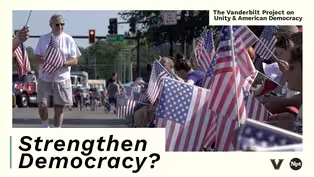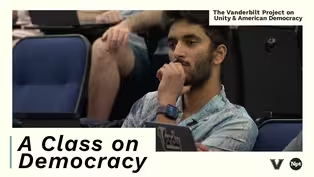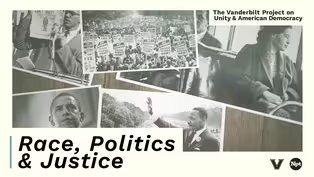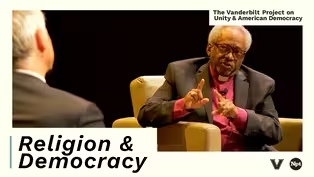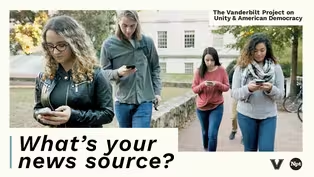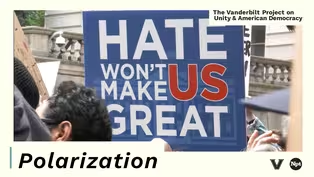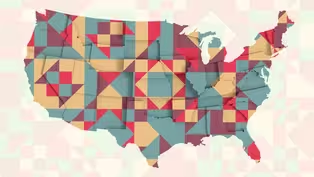Strengthening Democracy
Clip | 8m 10sVideo has Closed Captions
How Vanderbilt's Unity Project promotes unity, inclusivity, and active civic engagement.
A look into the strategies and initiatives of The Vanderbilt Project on Unity & American Democracy. The project illuminates the challenges democracy faces and the pioneering solutions to promote unity, inclusivity, and active civic engagement. Explore how this visionary project is reshaping the future of American democracy, and creating a stronger, more resilient foundation for our nation.
Problems playing video? | Closed Captioning Feedback
Problems playing video? | Closed Captioning Feedback
Strengthening Democracy
Clip | 8m 10sVideo has Closed Captions
A look into the strategies and initiatives of The Vanderbilt Project on Unity & American Democracy. The project illuminates the challenges democracy faces and the pioneering solutions to promote unity, inclusivity, and active civic engagement. Explore how this visionary project is reshaping the future of American democracy, and creating a stronger, more resilient foundation for our nation.
Problems playing video? | Closed Captioning Feedback
How to Watch
is available to stream on pbs.org and the free PBS App, available on iPhone, Apple TV, Android TV, Android smartphones, Amazon Fire TV, Amazon Fire Tablet, Roku, Samsung Smart TV, and Vizio.
(bright ethereal music) - I think we should have more of a space to just be able to, like, say what we want and, like, have honest conversations without, like, falling too far into, like, attacking each other.
- If education was a main criteria for the people in power, being in power, then I think that could change a lot.
- [Crowd] No!
- [Participant] I think the hatred on both sides is the biggest problem facing us.
- I feel like we all hope everyone can be, like, more understanding for each other.
- [Participant] I think we need to reframe the way that we think about where each of us lies on a political spectrum.
- That's a loaded question, 'cause the answer is a lot.
- [Participant] I feel like not a lot of people's words are being put out there, like, the majority.
- [Participant] Making it not as black and white and just more, like, fluid throughout.
- [Participant] I'd say, like, so many issues with campaign funding, so many issues like Super PACs, things like that.
- [Participant] And I think people have goals that are more similar than they realize, but because of the underlying beliefs they have, perhaps there are different ways of going.
(tense ambient music) - [Narrator] The question of how to strengthen American democracy is difficult to answer.
Not because there's no answer, but because there's an abundance of answers.
From fostering healthy communication, to promoting civil discourse, enhancing education, encouraging critical thought, a commitment to democratic principles, the list is long.
However, at its core, the solution depends on compromise.
(gentle ambient music) - We are absolutely struggling with the capacity to compromise and not just compromise for compromise sake.
I get very tired of that.
This is not about civility, so that we can all just come to a 50% conclusion.
Sometimes that's not the right thing to do.
Sometimes the other side is wrong, and you have to call that out.
But most of the time in American history, it's been a little more mixed.
And that's the nature of American democracy.
- When we hire politicians, when we elect a senator, when we elect a president, we not just elect them to do our bidding, we also elect them for their judgment.
And we want that to be part of this process, because they're "experts."
- And the hopes for this project is the whole idea of let's talk about what's involved in governing.
I mean, I'm afraid we've lost the idea of what're we actually electing people to do.
We're not electing people to beat the other side.
We're electing people again, to solve problems and do things that we can't do for ourselves.
We cannot build interstate highway systems ourselves.
We cannot set up a system of justice ourselves.
So we hire people, that's what we elect people to do, is to do those things.
And so we need to think about, like, what are we actually electing?
We're not just electing them to beat the other side.
We're electing them to do certain functions.
- That's why debate becomes very important, because we can influence each other's opinion, but also if we're going to be functional in the way we do it, in the healthy way, is why I'm arguing for healthy competition over deadly competition, over violent, over hateful, over such divisiveness of where we lose community.
- This stuff's hard.
One of my conclusions after being, you know, in office for almost 16 years is the decisions that got to me, particularly as governor, by the time I got there, if there was an easy answer, it was made long ago, okay?
And there's usually a really good other side to the argument and we need to remember that number one, that the complexity of the issues before our leaders, number one, and number two, to give a little grace.
(crowd cheering) How's this yelling at each other?
How's that working out for us?
It's not.
And so let's try a different approach.
Try saying, "All right, I'm willing to listen, and let's see if we can get to the best solution together."
(crowd cheering) - Leadership, it starts with you.
You have a platform.
So the one thing that the mayor, the governor, whomever the elected official is, they have is a platform and a microphone, and people are listening.
And so if you set a tone, the words, the actions, et cetera, that help people model that behavior, then I think, like, you're going to begin to see a shift in attitude.
And right now we are, I think, we are way too caught up in national debates, and we are not having enough conversations around local governance.
And the national rhetoric is influencing how we are engaging with each other at the local level.
- My hope is that all of us would look and say, "Listen, there's something bigger that we get to be a part of that's not just about ourselves."
And this idea of winning is just not the right path.
The issue should always be about what's the right answer?
Not what's my answer.
What's the right answer?
- So this comes back to all of us, right?
We have to incentivize people saying, "You're right on this one.
You're wrong on that one."
We have to support people who are willing to compromise, because as Lincoln said, "All men act on incentive."
- I was in Berlin right after the Berlin Wall fell, and I saw something that somebody had painted on what was left of the wall that has stuck with me to this day.
And it said, "When a lot of little people in a lot of little places do a lot of little things, big changes happen."
I think here at the Vanderbilt Project, we're not under the illusion that we're gonna single-handedly ride in and save democracy and change the level of discourse in the country.
But we think we can play our role by engendering conversations on this campus and in this state and around the country by bringing in voices that can speak to that.
Sometimes those voices aren't always voices that, you know, all of us in the room even agree with.
But the point is to start having those conversations.
- What was your reaction to the prosecutor's statements?
- [Samar] These are ways to bring people together, to explore old and potentially new narratives that are inspired by old narratives to move forward together in positive ways.
- What's vital is not us, we screwed it up.
(laughing) People who look like me are the problem.
What matters is the next generation.
And they need to encounter these case studies.
They need to understand these forces.
They need to take the time to engage with important texts, important arguments in order to create this habit of heart and mind where democracy has the capacity to self-correct and create a world that you wanna live in.
- The question is, like, what are you gonna do about, what am I going to do about it?
And you say, "Well, I'm not elected to anything."
No, but you're a part of a lot of conversations.
Like I said, real world and online.
And if those conversations can start changing, again, back to the Berlin Wall quote, "A lot of little people in a lot of little places do a lot of little things, the world can change."
(bright gentle music)
Video has Closed Captions
Clip | 8m 10s | How Vanderbilt's Unity Project promotes unity, inclusivity, and active civic engagement. (8m 10s)
Clip | 8m 29s | A Vanderbilt course helping students understand how democracies do and do not work. (8m 29s)
Clip | 9m 26s | The profound influence and historical and contemporary impact of race on politics. (9m 26s)
Clip | 9m 57s | The relationship between religion and politics and how it shapes democracy. (9m 57s)
Clip | 8m 33s | The Vanderbilt Unity Project explores how information and disinformation affect politics. (8m 33s)
Video has Closed Captions
Clip | 10m 30s | The Vanderbilt Unity Project explores polarization in politics and its root causes. (10m 30s)
The Vanderbilt Project on Unity & American Democracy Trailer
Video has Closed Captions
Preview | 30s | The Vanderbilt Project on Unity & American Democracy seeks to supplant ideology with fact. (30s)
Providing Support for PBS.org
Learn Moreabout PBS online sponsorship
- News and Public Affairs

Top journalists deliver compelling original analysis of the hour's headlines.

- News and Public Affairs

FRONTLINE is investigative journalism that questions, explains and changes our world.












Support for PBS provided by:
